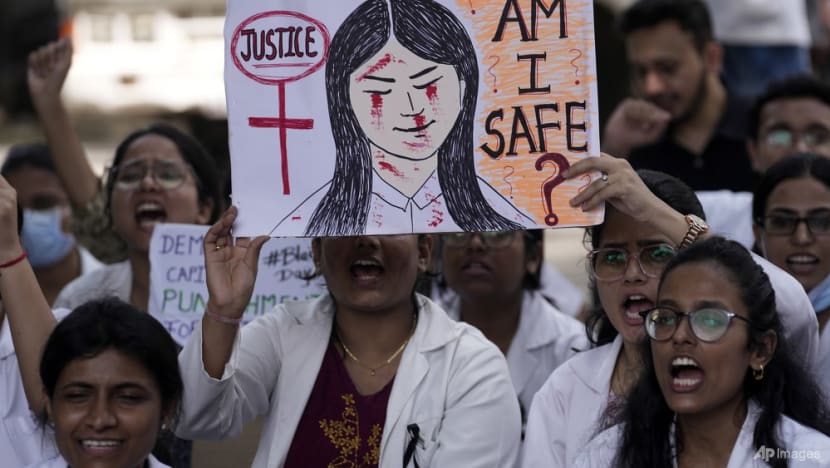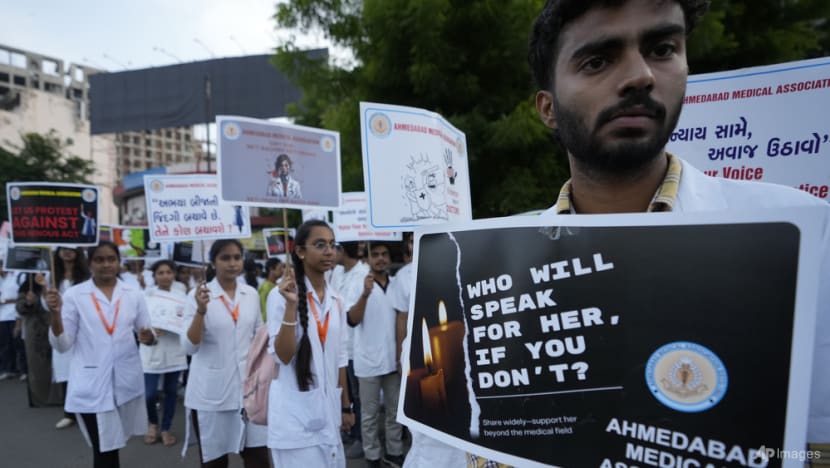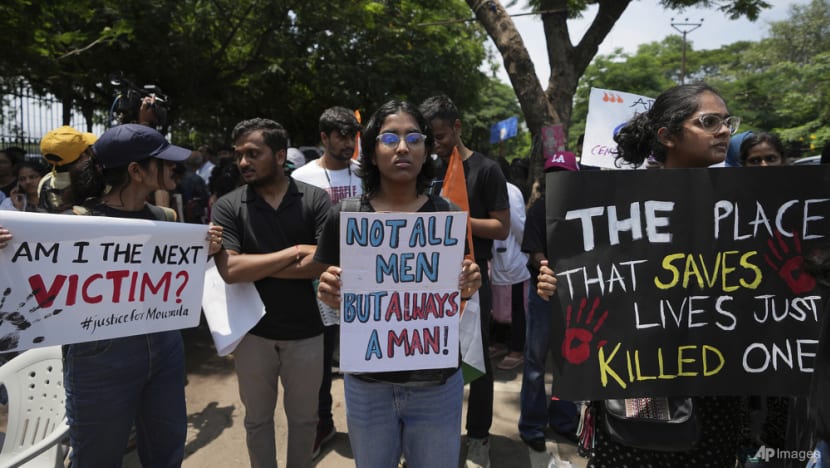CNA Explains: Why India’s doctors are protesting systemic violence after rape and murder of colleague
Legislation alone will not resolve India’s deep-rooted problem with gender-based violence, say advocates calling for a comprehensive overhaul of the system.

Resident doctors and medical students stage a protest in Mumbai against the rape and killing of a doctor at Kolkata's RG Kar Medical College, India, Aug. 17, 2024. (Photo: AP/Rajanish Kakade)

This audio is generated by an AI tool.
The gruesome rape and murder of a trainee doctor has sparked outrage in India and triggered massive protests across major cities.
Doctors in numerous hospitals have temporarily refused care for non-emergency patients, demanding swift justice for the victim and a safer workplace for healthcare professionals.
Campaigners say legislation alone will not resolve India’s deep-rooted, systemic problem with sexual violence and have called for a comprehensive overhaul of the system.
What happened?
The attack took place on the night of Aug 9 at the RG Kar Medical College in the eastern city of Kolkata.
The partially-clothed body of the 31-year-old junior doctor was found bearing extensive injuries in the hospital’s seminar hall, where she had gone to rest during a gruelling 36-hour shift.
A police volunteer who worked at the hospital has been arrested and charged with the crime.
What’s the reaction?
Last weekend, hundreds of thousands of medical workers walked out on their jobs, shutting down non-emergency services in the world’s most populous country.
Junior doctors across several states have refused to end what started as a 24-hour strike, saying they will cease work indefinitely until demands are met.
They want more stringent laws to protect healthcare workers from violence, increased security in hospitals and safer spaces to rest.

Medical workers work long, stressful hours in facilities with limited resources. Common complaints include inadequate toilets, poorly lit areas, a lack of checkpoints to screen visitors and no alarm systems for workers to call for help in an emergency.
Ordinary Indians have joined the protests, taking to the streets to voice anger at the chronic issue of violence against women.
Politicians, Bollywood celebrities and prominent athletes have also expressed shock at the crime, calling for justice and stricter punishments.
The government has urged doctors to return to duty.
India’s top court on Tuesday (Aug 20) set up a national task force to make recommendations to ensure the safety of healthcare personnel at their workplace.
What will the task force do?
The panel is tasked by the Supreme Court to examine sweeping reforms to the healthcare system.
These include separate resting rooms for female staff, night patrols, adequate lighting across facilities, high-resolution CCTV coverage, more adequately-trained security personnel, a control room for quick security response, and employee panels for quarterly safety audits.
“We are here to ensure their safety and protection," the court said.
Protesting medics said the court's directives do not address the core problems of insufficient funding and staffing, urging authorities to do more.
Vrinda Grover, a lawyer practising at the Supreme Court, told CNA’s Asia First on Thursday the panel – led by senior doctors – needs input from nurses and other medical workers who are even more at risk than doctors.
Advocates said the task force serves to improve working conditions but will not address the wider, systemic issues of prejudice and gender-based violence plaguing the country.

Are women in India more at risk of violent crimes?
Yes, government data shows. Almost 90 rapes a day were reported in 2022 in the country of 1.4 billion people.
Analysts said countless more assault cases go unreported due to the stigma associated with sexual crimes, or a fear of retaliation or disbelief.
The gruesome nature of the Kolkata doctor's killing has drawn parallels with the notorious 2012 gang rape and murder of a young woman on a bus in New Delhi. The horrific crime similarly brought furious protesters onto the streets, paralysing major cities for weeks.
The government then announced tougher sentences for rape – including the death penalty for repeat offenders – but campaigners said little has changed.
Activists accused authorities of only acting whenever high-profile incidents stoke public anger, but not resolving underlying issues.
“Every time there is a brutal incident of sexual violence, the responses by the state have traditionally been very knee-jerk by providing some protocol or law. But the larger work of preventing sexual violence doesn't taken place,” said Jhuma Sen, an advocate practising at the Calcutta High Court and Supreme Court.
Will tougher laws deter crimes against women there?
The short answer is “no”, said analysts who point to the unabated crimes against women in the decade since the New Delhi rape-murder.
Grover, who helped draft a criminal law amendment against sexual assault in 2013, said implementation of India’s laws remains a problem, hence the deterrence value of the death penalty is “zero”.
“Sexual assault is not considered a serious crime unless it is accompanied by severe brutality,” said the lawyer, also a human rights activist who has represented survivors of sexual violence.
“The work of the state is to ensure that there is certainty of punishment in each case, and we have not seen that.”
She added that the entire process, from investigation to prosecution, is mired by prejudices and bias, leading to victim blaming, discrimination, and a lack of accountability by law enforcement.
“Even today, women walking into a police station are not assured that their complaints will be registered. Very often, that is determined by their socio-economic status, as well as the profile of the perpetrator,” Grover said.
“We are a society that unfortunately is hierarchical in nature, not just on grounds of class, but also of caste, which is a deeply entrenched discriminatory attitude.”
Analysts said that while harsher penalties may still instil fear of consequences, the only permanent solution to drastically reduce gender-based violence is to demolish patriarchal thinking and adopt a mindset that women are equal to men.
“Higher incarceration is not an effective deterrent because rape is not simply just a legal issue. It is a systemic societal issue,” said Rashmi Venkatesan, an assistant professor at the National Law School of India University.
“Rape is really about patriarchal violence and oppression. Without addressing those issues, the law is insufficient.”
What are advocates hoping for?
They want an overhaul of the system, not just a safer environment for medical professionals, but for all women in the country.
Aditi Chawla, vice president of the Resident Doctors’ Association at New Delhi’s Vardhman Mahavir Medical College, said education at home is fundamental.
“Men have to understand they cannot do something like this, not even to have that thought in their minds. Tell our children what’s right and what’s wrong. It all begins from awareness and upbringing,” she said.
Meanwhile, Jhuma Sen, who also researches and writes on gender justice and human rights, said the authorities too often frame violent incidents as a lack of workplace security – as evident in Kolkata – instead of addressing the deeper societal issue.
She has filed a petition before the Supreme Court to set up a committee to conduct a gender audit to assess the institutionalisation of gender equality in both public and private spaces.
“My opinion is that we have enough laws. The issue is about implementation. Every woman should be able to access a workplace with the dignity and safety that she deserves,” she said.
Grover said the state needs to institutionalise safety mechanisms for women, who contribute significantly to the nation’s economy but receive far fewer rights and benefits.
She said the system needs to implement consequences for those who fail at their jobs to protect victims, including members of law enforcement and the judiciary.
“We won’t see a change… until and unless we start ensuring a certainty of process. The result must be as per law, and the legal process must maintain its sanctity. We have to address impunity at each level,” she said.














